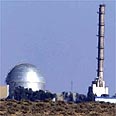
Disarm Israel of nuclear weapons
Op-ed: Israel says nuclear-free Mideast will be possible only when peace is established, but continues occupation
Sixty-eight years after atomic bombs were dropped on Hiroshima and Nagasaki, Israel's most pressing security issue is Iran's nuclear program. How are we doing? So-so. The moderate image of the newly-elected Iranian president significantly lowers the possibility that Israel will be able to strike, while Iran is close to obtaining nuclear capability. After Israel invested a fortune in the attack option, the most likely nightmarish outcomes are a regional arms race or a balance of terror.
How did we reach this point? Seemingly, there was nothing else we could have done. There are only two alternatives: An Iranian bomb or an Israeli attack. Israel wanted to attack, but will apparently get the bomb. This was expected. Why? Mainly due to the need to marshal global support for a strike and exhaust the sanctions policy. The sanctions imposed on Iran delay a military operation because they have to be given a chance to work – so it always appears that the time for an attack has not come yet, until eventually it will be too late. Secondly, an attack on Iran would endanger Israel and the entire region, so many are against it - both in Israel and in the international community. Thirdly, even if Israel does attack, it is doubtful that such a strike will stop Iran's race toward a nuclear bomb.
So why did Israel choose such an expensive policy that is doomed to fail? The answer is clear: The alternative is a nuclear balance of terror with a hostile and radical regime, in addition to the danger of nuclear proliferation. Although the chances of an attack are slim, one might wonder whether this course of action would not be worth pursuing, since everything must be done to stop Iran's nuclear program.
But it turns out that "doing everything to stop Iran's nuclear program" does not include one very reasonable option: A diplomatic initiative for nuclear disarmament. Of course we cannot be guaranteed in advance that such an initiative will bring about sufficient arrangements, and the price is relinquishing our nuclear capabilities and counting on conventional force or, perhaps, an American nuclear umbrella. Before dismissing this idea, one must keep in mind that a nuclear bomb does not provide a magical solution, and the prospect of an Iranian nuclear bomb is not too comforting either.
The disarmament option is being ignored because Israel has been promoting the "villa in the jungle" doctrine since the 1990s: It claims there is no partner, it rejects the Arab Peace Initiative and wants to remain the only nuclear-armed country in the region at any cost.
The director of the Israel Atomic Energy Commission, Shaul Horev explained the Jewish state's refusal to take part in a regional non-proliferation conference by saying that a nuclear-free Middle East "will be possible only after the establishment of peace and trust among the states of the area, as a result of a local initiative, not of external coercion."
But Israel is not advancing "peace and trust among the states of the area" because that would require ending the occupation, while Israel insists on continuing the occupation – even at the price of being stuck with the sad choice between a bomb and a military strike. The combination of counting solely on force and the addiction to the occupation has brought Israel to a broken trough.
Netanyahu may have agreed to resume talks with the Palestinians in order to strike a deal with the US: A strike in Iran in exchange for peace negotiations. It is also possible that Israel resumed talks to fend off American and European pressure on the Palestinian issue. Either way, this is also the last opportunity to rid ourselves of the "villa in the jungle" doctrine and work towards ending the occupation, responding positively to the Arab Peace Initiative and leading an initiative for the regional disarmament – before the window of opportunity closes and before Iran joins the nuclear club.
Yuval Eylon is a faculty member at the Open University's Department of Philosophy










